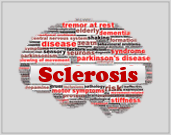
Sclerosis
Sclerosis: is an autoimmune disease that affects the central nervous system (brain, spinal cord and optic nerves). MS is a chronic disease that often progresses by relapses, followed by periods of remission.
This disease is a major public health issue because it affects an active population, in the process of building a life project, with an average age of onset of 30 years.
It is characterized by lesions called "plaques" in which the protective sheath of the neurons called "myelin" is destroyed leading to a degeneration of the nerve cells, the neurons, with a loss of communication between the brain and the peripheral organs. Myelin is the protective sheath of the nerve cell extensions (axons). It also promotes faster conduction of nerve impulses. This disease is called autoimmune because the immune system, whose role is to protect the body against pathogens (viruses, bacteria), attacks in this case a compound of the body itself, called "self", in this case myelin.
The majority of patients present their first symptoms between the ages of 25 and 35, with a high proportion of women (3 women to 1 man). Multiple sclerosis usually evolves in 2 phases. The first, characterized by transient attacks of symptoms, is called the relapsing-remitting phase. It begins around the age of 30 and represents 85% of initial forms. The second phase, which generally begins 10 to 20 years after the onset of the disease, is called the progressive phase. It is characterized by the continuous installation of permanent residual symptoms responsible for a functional cognitive or motor handicap.
There are several biomarkers that may be associated with MS
1. Cerebrospinal fluid (CSF) biomarkers: CSF is fluid that surrounds the brain and spinal cord. CSF biomarkers that can be used to diagnose MS include the presence of specific antibodies and oligoclonal IgG bands.
2. Imaging biomarkers: Magnetic resonance imaging (MRI) is often used to diagnose MS, and certain MRI features can be used as biomarkers, including the presence of lesions in the brain or spinal cord.
3. Blood biomarkers: There are also blood biomarkers that can be used to help diagnose MS, such as the presence of anti-myelin antibodies, cytokines, and T cells.
4. Biomarkers of neurodegeneration: MS is characterized by progressive neurodegeneration, and certain biomarkers may be associated with this process, such as neurofilament light (NfL) and tau protein.

